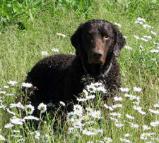
This is a placeholder text
Group text
by Bob McKown on 19 August 2010 - 12:08
In the last couple weeks I,ve been involved with a few threads concerning working dogs being good pet dogs or I should say working line dogs. Obviously a working line dog is going to have a disposition of more drives prey,aggression,activity,ect... hopefully just by it,s mere breeding. My question is, With proper training(which hopefully we are all following) instinctive actions(those driven by genetic drive and breeding) should still be controllable with proper training.
My example, My Axel is a great dog in the house and with people in general, shows good drives on the field. His down fall was the inability of his handler(that would be me) to learn early on to cap drive and work it to my advantage. But always able to work well around strangers. Several helpers that have worked him in the past have all said that he has alot of aggression in him but with its training never was pushed it(I guess you would have to know him to fully understand that comment). His brother Apache i,ve been told was a pretty serious dog and his aggression was evident from the start(not a problem if handled well) . My question is if two litter mates from the same breeding carry the same genetics is training and environment more a issue then genetic drives?.
This discussion is because of a breeding I,m considering doing and would like some input on the subject of Natural drives versus properer control training.
by ShadyLady on 19 August 2010 - 12:08
Of course environment has a lot to do with how any dog turns out. Nurture vs Nature, is that what you are asking?
I think in any litter there are puppies that, if all treated equally, and say trained by the same person, will be different in some ways regarding some are easier to bring out their drives and some more challenging. However, I've seen littermates who all inherited great, great drives, & who all turned out to be good working dogs. I saw one litter, where all of the handlers were attending the same club. Some dogs didn't do as well as the others, because of handling. When one dog changed hands when she was older (2yrs+), she really improved.
Then I have the opinion that a great trainer can make a marginal dog look better than s/he is, but when it comes to littermates, it's easier to assess as you know or can see that the drives are there, even if they haven't been fully brought out.
Not sure if this is what you were wanting opinion on??
by Bob McKown on 19 August 2010 - 12:08
I guess my question stems from the fact that (we have all heard it) of dogs coming up the leash on the handler or the agression being high and uncontrolable persay. But i,ve seen dogs that I would call very aggresion active worked well and under good control with different handlers so in the end is the means the the handler and training or the ends the gentic disposition?.
I believe every dog can be handled and controlled with the right handler.
by ShadyLady on 19 August 2010 - 12:08
by VonIsengard on 19 August 2010 - 13:08
The average Joe who wants a buddy for his kids or to hang with around the house is in way over his head with a hard, high drive dog, and likely doesn't have the time or inclination to give said dog the training and time it really needs to succeed in the home.
by Sam Spade on 19 August 2010 - 13:08
by ShadyLady on 19 August 2010 - 13:08
by Sam Spade on 19 August 2010 - 14:08
by ShadyLady on 19 August 2010 - 14:08
by LadyFrost on 19 August 2010 - 14:08
reason I am asking is that if your dog does not do any of those things because of discipline/work you provided, so you accomplished same things behavior wise with exception of higher drive...or am I missing something?
:)
Thanks.
Contact information Disclaimer Privacy Statement Copyright Information Terms of Service Cookie policy ↑ Back to top




